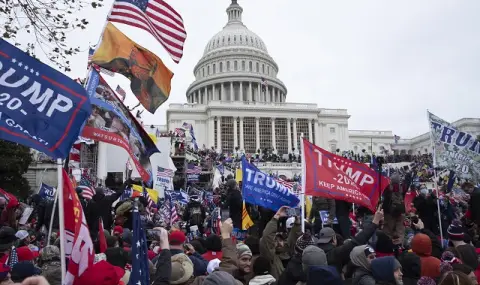Republican US presidential candidate Donald Trump claims that if he does not win the election on November 5, he will consider it a fraud and will not accept the results - just as he did four years ago when he lost to Democratic President Joe Biden, reports "Reuters".
"If I lose - I'll tell you what, it's possible. Because they cheat. That's the only way we're going to lose - because they're cheating," Trump emphasized at a rally in Michigan in September.
After Trump lost the 2020 election, he and his allies tried to overturn the result through dozens of lawsuits that ultimately failed to change or delay the vote count.
He also pressured officials in Georgia to get him more votes; and his supporters stormed the US Capitol on January 6, 2021 in a failed attempt to prevent Vice President Mike Pence from certifying Biden's victory.
A key difference this time around is that Trump doesn't have the presidential levers of power he had in 2020. And new state and federal laws have been introduced to make it harder to influence election results.
Still, Trump and his allies have been laying the groundwork for months to press charges if he loses on Nov. 5. The Republican could challenge the eventual victory of his Democratic challenger Kamala Harris in court or raise doubts about the validity of her victory among his supporters, which could have unintended consequences.
Republicans and Democrats expect the vote count could drag on for several days after Nov. 5 as mail-in ballots are tabulated and other votes are tallied and verified.
If Trump appears to be losing, the delay will give him an opportunity to declare fraud and try to undermine confidence in election officials, while likely emboldening his supporters to protest. He has already threatened to arrest election and other government officials for "unscrupulous behavior", although he must first win the election.
Trump can make his case directly to the American public without waiting for evidence, using social media, press conferences and interviews.
"President Trump has made it clear that we must have free and fair elections," said Carolyn Leavitt, a spokeswoman for the Trump campaign.
Republicans have already preemptively filed more than 100 lawsuits in contested states that will decide the election to set the stage for post-vote challenges. Including claims - without evidence, that non-US citizens will vote en masse.
Both parties plan to send thousands of trained volunteers, called observers, to observe voting and vote counting with a mandate to report any irregularities.
Some voting rights activists worry that Republican monitors could be disruptive, but the GOP says they have been trained to follow the law.
As they did in 2020, Trump's allies in key states — local election officials, state legislators and perhaps judges — could try to delay the certification and confirmation of the state's official result through allegations of fraud.
/p>
Those efforts were unsuccessful last time, and election law experts note that the laws in those states are clear -- local officials don't have the power to throw out ballots or disrupt the process.
Five of the seven contested states have Democratic governors. But Democratic activists worry about Georgia, whose state election commission recently gave local officials unprecedented powers to conduct investigations, a move they say could open the door to unscrupulous individuals trying to challenge or delay the vote count.< /p>
However, a Georgia judge ruled this week that local officials must certify the results and have no right to do otherwise.
All states must submit their certified totals before the Electoral College meets in December and voters cast their ballots. That vote is then submitted to Congress for final certification in January.
Trump-fueled court challenges and certification delays could cause a state to miss the filing deadline. That could raise objections from Republicans in Congress.
Some election law experts caution that it is hard to predict how new legal disputes over certification might be resolved, especially if they are heard by judges sympathetic to Trump's claims.
After the 2020 election, Congress passed reform legislation that makes it clear that the vice president, who in this case would be Harris, does not have the authority to delay national certification or throw out a state's results, as Trump urged Pence to do. did in 2020
The measure also requires that a recount in a state's election cannot be challenged unless 1/5 of the members of each house of Congress disagree. A majority vote in each house is then required for the objection to be considered valid.
In the unlikely event that enough electoral votes are thrown out that no candidate reaches the necessary majority, the newly elected US House of Representatives will choose the next president.
Any effort by Trump to suggest that the election was rigged could potentially lead to civil unrest, as happened on January 6, 2021
Hundreds of people involved in the January 6 attack on the Capitol were convicted and sent to prison for their actions - a powerful deterrent to others who might consider taking similar steps.
